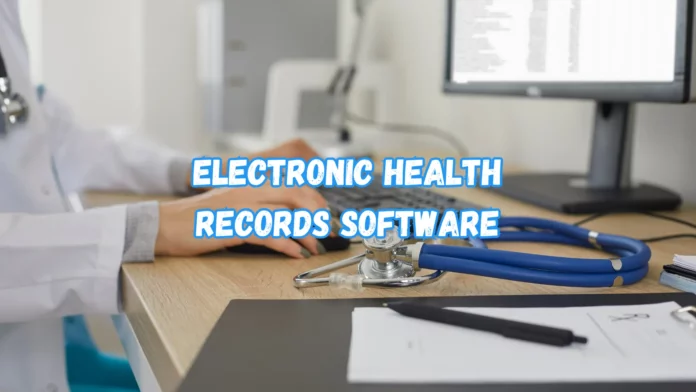introduction “Electronic health records software”:
1. Epic Systems
Epic Systems has long been a leader in the EHR industry. Known for its robust functionality and seamless integration capabilities, it serves large hospital networks and healthcare systems. Key features include customizable dashboards, patient portals, and interoperability with other systems. Additionally, Epic’s focus on data security ensures compliance with HIPAA regulations.
2. Cerner
Cerner offers a highly scalable EHR platform that caters to both small practices and large healthcare organizations. It boasts advanced analytics, telehealth integration, and patient engagement tools. Why Cerner stands out: its adaptability and user-friendly interface make it a top choice for many providers.
3. Allscripts
Allscripts is renowned for its cloud-based EHR solutions that are ideal for ambulatory care and specialty practices. It supports data sharing across networks and includes features like e-prescribing and care coordination. Its scalability ensures it can grow alongside your practice.
4. Athenahealth
Athenahealth combines an intuitive EHR platform with comprehensive practice management tools. Its cloud-based infrastructure supports real-time updates and ensures maximum uptime. With excellent billing and revenue cycle management capabilities, Athenahealth helps practices optimize their financial performance.
5. NextGen Healthcare
NextGen Healthcare is tailored for specialty practices, offering customized templates and tools for specific fields like dermatology, orthopedics, and pediatrics. Its focus on streamlining workflows and enhancing patient care makes it a go-to solution for specialists.
6. eClinicalWorks
eClinicalWorks is a favorite among small and mid-sized practices due to its affordability and extensive features. It provides population health management tools, patient portals, and telemedicine capabilities. The platform is also known for its AI-driven insights that help improve patient outcomes.
7. Meditech
Meditech offers a robust EHR system designed for hospitals and large healthcare networks. Its interoperability and focus on mobile-friendly interfaces ensure providers can access patient data anytime, anywhere. What sets Meditech apart is its commitment to innovation and reliability.
8. Kareo
Kareo specializes in providing EHR solutions for independent practices. It includes features like scheduling, billing, and telehealth in one cohesive platform. Kareo’s simplicity and cost-effectiveness make it a popular choice for smaller practices.
9. Practice Fusion
Practice Fusion is a cloud-based EHR system aimed at small practices. It offers easy-to-use features such as e-prescribing, charting, and patient scheduling. With a strong focus on affordability and usability, it’s an excellent choice for providers with limited budgets.
10. Greenway Health
Greenway Health provides a versatile EHR solution with tools for revenue cycle management, patient engagement, and telehealth. Its focus on innovation and compliance ensures that practices stay ahead of regulatory changes while delivering exceptional care.
Key Features to Look for in an EHR Software
When choosing an EHR solution, it’s essential to evaluate the features that matter most to your practice. These include:
- Interoperability: Ensures seamless data sharing between systems.
- Customization: Offers templates and workflows tailored to your specialty.
- Cloud-based Infrastructure: Provides flexibility and scalability.
- Data Security: Protects patient information and ensures compliance with regulations.
- Patient Engagement Tools: Enhances communication and satisfaction.
How to Choose the Best EHR for Your Practice
Selecting the right EHR requires careful consideration of your practice’s needs and goals. Here are some tips to guide your decision:
- Assess Your Needs: Identify your practice’s size, specialty, and workflow requirements.
- Compare Features: Look for features that align with your priorities, such as telehealth or analytics.
- Consider Scalability: Ensure the system can grow with your practice.
- Check Reviews and Demos: Read user reviews and request demos to evaluate usability.
- Budget Wisely: Balance cost with the value provided by the software.
The Future of EHR in Healthcare
As we move into 2025, EHR software will continue to evolve with advancements in AI, machine learning, and interoperability standards. These innovations will further enhance efficiency, patient outcomes, and provider satisfaction. Staying updated with the latest trends ensures your practice remains competitive.
Conclusion
Choosing the right Electronic Health Records (EHR) software is critical for improving efficiency, enhancing patient care, and staying compliant with industry standards. The top 10 EHR solutions listed here represent the best options for 2025, catering to a variety of needs and budgets. By evaluating features, scalability, and usability, you can find the perfect EHR to elevate your practice. Take the time to explore these options and invest in the solution that aligns with your goals for 2025 and beyond.
Tags: Electronic Health Records, EHR Software, Best EHR 2025, EHR Solutions, Top EHR Software


























